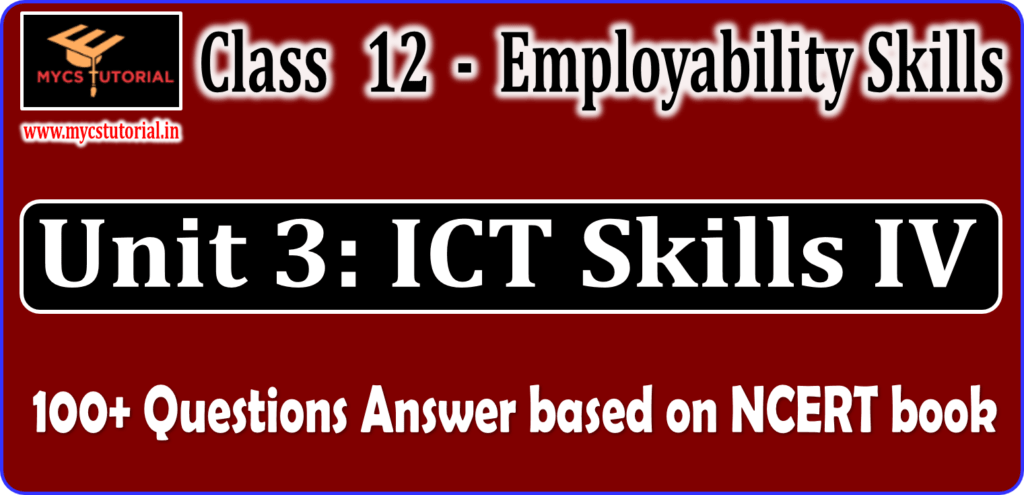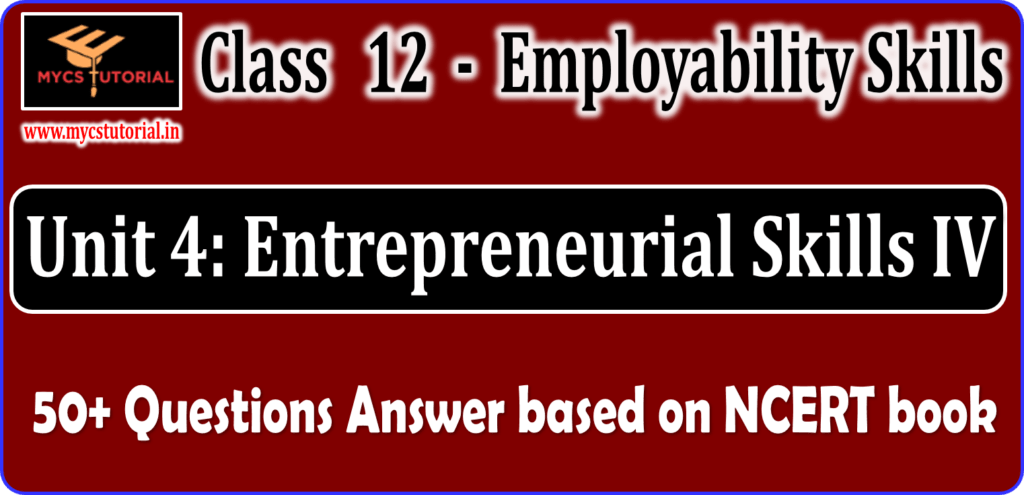Class 12 Employability Skills
Class Notes on Unit 1 Communication Skills
Unit 1- Communication Skills
Communication
Communication is a two-way process through which information or message is exchanged between individuals using language, symbols, signs or behaviour.
Parts of Communication:
Speaking, listening, reading and writing are the parts of communication, which help us to understand others.
To learn a language, one needs to develop four key skills, namely listening, speaking, reading, and writing.

Communication skills are needed to communicate effectively with people and customers.
Elements of Communication:
Communication involves a sender, who encodes and sends a message through a channel, and a receiver, who decodes the message and gives feedback.
Feedback is important in communication as it helps in knowing whether the receiver has understood the message or not.

Active Listening
Effective communication involves skills that can be utilised to send messages that are clear, concise, and accurate.
A clear statement is one which conveys the exact message that you are trying to convey to the other person.
Here, we have two sentences. Now, which one do you think is a clear statement?
- (i) He went to his manager and said, “Please allow me to reach office at 11 AM on Tuesday, 13 April 2021, as I have an appointment with a dentist.”
- (ii) He went to his manager and said, “Please allow me to reach late to the office on Tuesday, 13 April 2021, as I have an appointment with a dentist.”
Statement 1 is a Clear statement, because time is mentioned.
A concise statement is appropriately brief or to the point.
- (i) The manager replied, “Alright, you may come late.”
- (ii) The manager replied, “Alright, you may come late. But it is a matter of great concern that most employees come late and you are also developing the same habit.”
In the first sentence, measurable information is mentioned, which makes the sentence accurate.
Advantage of Communication Skills: Effective communication skills help us to communicate the message correctly, precisely, and completely.
Disadvantage: Lack of communication skills can result in confusion, frustration, wasted effort, and missed opportunities.
Listening skill
Every effective conversation starts with listening. Listening skill is one of the most important communication skills.
It is important to learn to give undivided attention to a person with whom a conversation is taking place.
Given below are some reasons why listening attentively is important.
- We listen to obtain information.
- We listen to understand.
- We listen to enjoy.
- We listen to learn.
- We listen to build and maintain relationships.
- We listen to resolve conflicts.
Without the ability to listen attentively, messages can be easily misunderstood. Thus, communication breaks down and the sender of the message can easily become frustrated or irritated.
Active listening
Active listening is an art, which comprises both a desire to comprehend, as well as, offer support and empathy to the speaker. It can affect your job effectiveness, the quality of your relationship with others, and hence, your overall well-being. Active listening allows you to understand the problems and collaborate to develop solutions.
The various factors that affect active listening are as follows.
- Eye contact: It is a form of body language. Maintaining an eye contact with the person you are talking to sends a signal to the speaker that “Yes, I am talking to you or listening to you”. Avoiding eye contact could mean that you do not want to listen to the person speaking to you.
- Gestures: These indicate to the speaker if you are listening or not. Keep your hand and feet still while talking to someone.
- Avoiding distractions: You need to identify the things that distract you. You must physically remove the distractions in order to listen attentively.For example, reducing the ringtone of your mobile phone or switching it off while attending a meeting or listening to someone will avoid distraction. Another example is that you should avoid glancing at the wristwatch frequently.
- Giving feedback: Feedback can be positive or negative. But in both the cases, one needs to be polite so that the person to whom the feedback is being given is not hurt or offended.
Stages of active listening:
The best kind of listening is ‘active listening’. It happens when you hear, understand, respond and remember what is being said.
The five stages of active listening are as follows.
- Receiving: It involves listening attentively.
- Understanding: It is an informed agreement about something or someone.
- Remembering: It refers to the retrieval or recall of some information from the past.
- Evaluating: It is about judging the value, quantity, importance, and amount of something or someone.
- Responding: It is about saying or doing something as a response to something that has been said or done.
How to ensure active listening?
You can remember the acronym ‘RESPECT’ to ensure active listening.
- R – Remove distractions that may hamper listening. For example, reducing the volume of television, radio, or mobile phone while talking to a person.
- E – Eye contact refers to looking at the speaker while listening.
- S – Show that you are listening attentively to the speaker through gestures.
- P – Pay attention and focus on what the speaker is saying.
- E – Empathise and feel the emotions of the speaker. Empathy is the ability to share someone’s feelings or experiences by imagining what it would be like to be in that person’s situation.
- C – Clarify doubts. Ask questions to clarify doubts.
- T – Tune yourself to the timing of the speaker, i.e., wait for the speaker to finish, and then, respond.
Overcoming barriers to active listening:
| Factors | How a factor can become a barrier? | How to overcome the barrier? |
|---|---|---|
| Being pre-occupied | When pre-occupied, you may not be listening to a person carefully. | Do not let emotions take over your mind. Keep away phones and digital devices. |
| Noise and visual Distractions | You may not be able to hear the other person clearly in a noisy environment. | Create a conducive environment to avoid misinterpretations and distractions. |
| Past experiences or mindset | You may have developed biases or prejudices based on past experiences and interactions. | Avoid developing biases and be objective in your approach when interacting with others. |
| Personal factors | Your personal feelings may affect your listening, for example, your preconceptions about the other person. | Allow the other person to finish speaking, and then, respond. |
By Anjeev Kr Singh – Computer Science Educator
Published on : February 15, 2024 | Updated on : September 18, 2024










